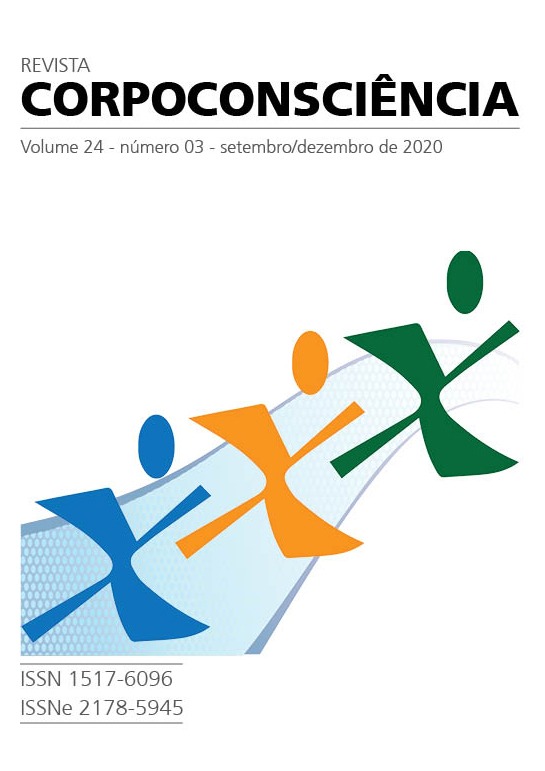KENDŌ PRACTICE AS A POSSIBILITY FOR PROMOTING ACTIVE AGING
Keywords:
Kendō; Martial Arts; Aging; AutonomyAbstract
It is common knowledge that aging is part of the natural processes of life, the number of elderly people has grown in the population and has attracted the attention of public health policies. To reach the needs of this public, it is necessary to offer inclusive practices. Possible practices that affect the physical, emotional, mental, psychological and spiritual aspects are the martial arts. Kendō is one of the modern disciplines of budō which consists of the practice of Japanese fencing, based on samurai fighting techniques. The purpose of this essay is to present the main characteristics of Kendō and how its practice can promote active aging. Some gerontological concepts were raised throughout the text such as autonomy, dependence, generativity, life quality, life span, active aging and subjective well-being, and it was possible to observe the relationships between the elderly kendoka and the contributions of this practice to the development process in this life stage.
References
ALL JAPAN KENDO FEDERATION. Japanese-english dictionary of kendo. 2. ed. Tokyo, Japan: All Japan Kendo Federation, 2011a.
ALL JAPAN KENDO FEDERATION. The official guide for kendo instruction. Tokyo: All Japan Kendo Federation, 2011b.
BERMAN, Harry. Generativity and transference heroics. Journal of aging studies, v. 9, n. 1, p. 5-11, 1995.
BOSI, Ecléa. O tempo vivo da memória: ensaios de psicologia social. São Paulo: Ateliê Editorial, 2003.
BRASIL, Ministério da Saúde. Glossário temático: promoção da saúde. 2013. Disponível em: <http://bvsms.saude.gov.br/bvs/publicacoes/glossario_tematico_promocao_saude.pdf> Acesso em: 30 set. 2020.
CAMARA, Fabiano Marques e colaboradores. Educação física na promoção da saúde: para além da prevenção multicausal. Revista mackenzie de educação física e esporte, v. 9, n. 2, p. 101-110, 2010.
CYNARSKI, Wojciech J. The philosophy of martial arts–the example of the concept of Ido. AUC Kinanthropologica, v. 53, n. 2, p. 95-106, 2017.
DEBERT, Guita Grin. A construção e a reconstrução da velhice: família, classe social e etnicidade. In: NERI, Anita Liberalesso, DEBERT, Guita Grin. Velhice e sociedade. Campinas, SP: Papirus, 1999.
DIENER, Ed; SANDVIK, Ed; PAVOT, William. Happiness is the frequency, not the intensity, of positive versus negative affect. In: DIENER, Ed (Edit.). Assessing well-being: the collected Works of Ed Diener. Springer, Dordrecht, 2009.
FERNANDES, Maria das Graças Melo; LOUREIRO, Lara de Sá Neves. Memória e história oral: a arte de recriar o passado de idosos. A terceira idade, v. 20, n. 45, p. 53-66, jun., 2019.
FERREIRA, Marilaine Matos de Menezes e colaboradores. A velhice: olhares das pessoas idosas e seus familiares. 2019. 174f. Tese (Doutorado em em Família na Sociedade Contemporânea). Universidade Católica de Salvador, Salvador, BA, 2019.
FREITAS, Elizabete Viana e colaboradores. Tratado de geriatria e gerontologia. 4. ed. Rio de Janeiro: Guanabara Koogan, 2016.
GIACOMONI, Claudia Hofheinz. Bem-estar subjetivo: em busca da qualidade de vida. Temas em psicologia, v. 12, n. 1, p. 43-50, 2004.
INSTITUTO BRASILEIRO DE GEOGRAFIA E ESTATÍSTICA – IBGE. Projeção da População. 2018. Disponível em: <https://www.ibge.gov.br/estatisticas/sociais/populacao/9109-projecao-da-populacao.html?=&t=resultados>. Acesso em: 12. set. 2020.
JUNGES, José Roque. Uma leitura crítica da situação do idoso no atual contexto sociocultural. Estudos interdisciplinares sobre o envelhecimento, v. 6, p. 123-144, 2004.
KESSEL, Zilda. Lembrar, contar, compartilhar: a memória como caminho para o diálogo intergeracional. A terceira idade, v. 15, n. 30, p. 52-63, 2004.
MARQUES, Bruna Gabriela. Autocuidado, atividade física e envelhecer: saberes e olhares nas vozes poéticas do Jardim Rincão. 2017. 209f. Tese (Doutorado em Educação Física). Universidade São Judas Tadeu, USJT, São Paulo, SP, 2017.
MATSUNAGA, Hikaru e colaboradores. Budo: the martial ways of Japan. Tokyo, Japan: Nippon Budokan, 2009.
MENDONÇA, Dário Lucas Costa de. Avaliação da qualidade de vida dos idosos lutadores de Kendô. 2017. 72f. Dissertação (Mestrado em Ortopedia e Traumatologia). Universidade de São Paulo, São Paulo, 2017.
MIRANDA, Maria Luiza de Jesus; GODELI, Maria Regina C. Souza. Música, atividade física e bem-estar psicológico em idosos. Revista brasileira de ciência e movimento, v. 11, n. 4, p. 87-94, 2008.
NAKIRI, Fuminori. Concept of budo and the history and activities of the Japanese Academy of Budo. Ido Movement For Culture. Journal of martial arts anthropology, v. 15, n. 1, p. 11-25, 2015.
NERI, Anita Liberalesso. Palavras-chave em gerontologia. 4. ed. Campinas, SP: Editora Alínea. 2014.
ORGANIZAÇÃO MUNDIAL DA SAÚDE (OMS). Relatório mundial de envelhecimento e saúde. 2015. Disponível em: <http://sbgg.org.br/wp-content/uploads/2015/10/OMS-ENVELHECIMENTO-2015-port.pdf>. Acesso em: 10 mar. 2017.
______. Envelhecimento ativo: uma política de saúde. 2005. Disponível em: <http://bvsms.saude.gov.br/bvs/publicacoes/envelhecimento_ativo.pdf>. Acesso em: 10 mar. 2017.
SASAKI, Taketo. Budo (the Martial Arts) as Japanese Culture -The Outlook on the Techniques and the Outlook on the Human Being. Arch Budo, 2008. 4: 46-49. Disponível em: <http://archbudo.com/view/abstract/id/10691>. Acesso em: 10 abr. 2019.
SYLVESTER, Katherine. Negotiating kendo capital and gendered identity in a japanese sports University Kendo Club. 2015. 29f. Tese (PhD Thesis). Victoria University, Melbourne, Australian, 2015.
Downloads
Published
How to Cite
Issue
Section
License
Autores que publicam nesta revista concordam com os seguintes termos:
- Autores mantém os direitos autorais e concedem à revista o direito de primeira publicação, com o trabalho simultaneamente licenciado sob a Creative Commons Attribution License que permitindo o compartilhamento do trabalho com reconhecimento da autoria do trabalho e publicação inicial nesta revista.
-
A Revista Corpoconsciência da Universidade Federal de Mato Grosso está licenciada com uma Licença Creative Commons - Atribuição 4.0 Internacional. Baseado no trabalho disponível em https://periodicoscientificos.ufmt.br/ojs/index.php/corpoconsciencia/index.
- Autores têm autorização para assumir contratos adicionais separadamente, para distribuição não-exclusiva da versão do trabalho publicada nesta revista (ex.: publicar em repositório institucional ou como capítulo de livro), com reconhecimento de autoria e publicação inicial nesta revista.
- Autores têm permissão e são estimulados a publicar e distribuir seu trabalho online (ex.: em repositórios institucionais ou na sua página pessoal) a qualquer ponto antes ou durante o processo editorial, já que isso pode gerar alterações produtivas, bem como aumentar o impacto e a citação do trabalho publicado (Veja O Efeito do Acesso Livre).





